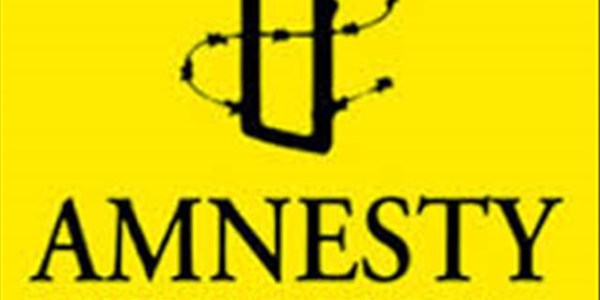National
2016 an awful year for human rights - Amnesty International─── 05:23 Thu, 23 Feb 2017

Johannesburg – Amnesty International says that, while South Africa experienced a decrease in human rights violations last year, there were still ongoing cases of xenophobia, police brutality and political violence.
The organisation revealed these statistics at the launch of the 2016/17 Global State of Human Rights report in Parktown on Tuesday.
According to Regional Director Deprose Muchen, desperation due to poverty, unemployment and inequality was driving more people onto the streets.
Muchena said ordinary people were no longer fearful, but were exercising their right to protest when governments failed to address constitutionally-guaranteed demands and needs.
He said this right to protest had given rise to the formation of movements like the This Flag movement in Zimbabwe - that calls on citizens to carry the country's flag with them as a sign of protest against the government's failure to provide a dignified life - and the Fees Must Fall movement in South Africa.
There was evidence of excessive use of force against students by police during the Fees Must Fall protests, Muchena said, including the firing of rubber bullets at close range when the use of force was neither necessary nor proportionate.
IPID reported that cases of police brutality and deaths in police custody were lower in 2016/2017 than in the previous year.
"There were 366 deaths as a result of police actions, over 200 deaths in police custody, 51 incidents of rape committed by the police, and 215 incidents of torture," said Shireen Mudukam, an Amnesty International researcher focusing on Southern Africa.
Discrimination against albinism
There was also a continuous increase in discrimination against LGBTI members. The organisation made reference to Lucia Naido and Noluvo Swelindawo, two lesbians who were killed last year in Katlehong and Khayelitsha respectively.
"Hate crimes, hate speech and discrimination against LGBTI people, including killings and assaults, continued. Such attacks were believed to be grossly under-reported to police," reads a report.
The report also found that gender inequality and discrimination continued to add to the negative effect of social, racial and economic inequalities, especially for marginalised groups of women and girls.
Children with disabilities continued to face multiple challenges of discrimination, exclusion and marginalisation, which denied them equal access to education. There was also an increase in instances of discrimination against albinism.
"In June, the Commission for Gender Equality found the requirement that girls undergo virginity testing to access tertiary education bursaries as imposed by a municipality in KwaZulu-Natal, violated constitutional rights to privacy, dignity and equality, and would perpetuate patriarchy and inequality in South Africa. The ukuhlolwa practice has since been removed as a requirement for attaining a bursary for females for the Uthukela District Municipality in Kwa-Zulu Natal."
There was improved access to free anti-retroviral treatment for a third of pregnant women living with HIV. This had resulted in a reduced maternal mortality.
SABC censorship
Recurring instances of xenophobia were noted, due to an increase in politicians blaming outsiders for scarce employment opportunities. This had resulted in deaths, displacement and injuries. In June last year, shops in Pretoria were looted. There was a report released last year into the 2015 violence against refugees, asylum seekers and migrants in KwaZulu-Natal.
Freedom of expression was a contentious issue, with the organisation lamenting the censorship faced by the SABC 8. The SABC suspended three senior journalists for allegedly disagreeing with the decision not to cover a peaceful protest against censorship, and abuse of power by the SABC.
"When five other SABC journalists objected to the suspensions, they were accused of misconduct. All eight SABC employees were then fired. The group filed a case with the Constitutional Court in July, arguing that their right to freedom of expression had been violated. Four of the journalists won a case at the Labour Court in July that SABC had violated labour procedures."
Last year, the Bloemfontein High Court upheld the appeal by 94 community health workers and Treatment Action Campaign (TAC) activists who had successfully challenged the constitutionality of an act criminalising the gathering of more than 15 people in a public space, without notifying the police in advance. The judgment affirmed that participating in a gathering without prior notice is not an offence.
The unprecedented resilience of civilians, despite the continuous crackdowns by various governments was commendable, said the organisation’s Netsanet Belay, Africa programme director for research and advocacy. It however came at a huge cost, with people being persecuted and killed.
'2016 was a pretty awful year'
Muchena said international indifference to mass atrocities, from Syria to Yemen to South Sudan, had become an entrenched normality.
Mukadam said the fact that some issues – such as xenophobia, excessive use of force by police, and attacks on member of the LGBTI community - recurred in the annual report, was due to a growing culture of impunity, and leaders who perpetuated human rights violations.
People needed to hold leaders accountable, and leaders needed to listen, she said.
"We need to see an end to this culture of impunity for human rights violations. We need to see a culture of accountability," said Mukadam.
The purpose of the report is to shine the spotlight on human right violations to hold governments accountable for protecting people’s rights, using documented and empirical evidence.
There was a spike in political violence in KwaZulu-Natal, leading up to last year’s local government elections in August. Fourteen local councillors had been murdered between January and July. Those targeted were election candidates and political party members.
"2016 was a pretty awful year for human rights. It was marked by a poisonous and divisive manipulation of identity politics by politicians who made cynical use of the 'us versus them' narrative," said Muchene.













